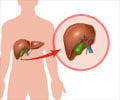Treating infants with high doses of steroids fails to improve medical outcomes in the end-stage pediatric liver disease biliary atresia, says a new study.

"The results from this clinical trial differ from previous reports of a benefit from steroid therapy on bile drainage or survival in biliary atresia," said Jorge Bezerra, MD, a lead investigator on the study and physician in the division of Gastroenterology, Hepatology and Nutrition at Cincinnati Children's Hospital Medical Center.
"Although we cannot exclude some small potential benefit from steroid treatment, we observed no statistical differences in two-year survival between patients receiving steroid treatment after surgery and those receiving placebo," Bezerra said. "Children receiving steroids during the study also developed serious adverse events more quickly, raising a potential increase in risks associated with steroid therapy."
Biliary atresia is the leading cause of pediatric liver transplantation in the world. The disease accounts for about 50 percent of transplants in children and 10 percent of transplants at any age. It results from inflammation and rapid accumulation of connective tissues that obstruct and restrict bile ducts from draining. The condition then manifests as cholestatic jaundice in the first few weeks after birth.
At diagnosis, the primary treatment is the hepatoportoenterostomy (HPE, the Kasai procedure) – a surgical procedure that removes the diseased bile ducts and gallbladder and connects an intestinal loop directly to the liver to restore bile drainage. Study authors point out that some clinicians suggest steroid treatment after surgery may help prevent additional fibrosis and improve bile drainage. The current study – called START (Steroids in Biliary Atresia Randomized Trial) – was designed to provide rigorous medical data to help answer that question.
The study involved 140 infants with a median age of 2.3 months. The initial study was conducted between September 2005 and February 2011, with follow up ending in January 2013.
Advertisement
When researchers compared survival rates between the steroid/non-steroid groups at age 24 months, 58.7 percent of children in the steroid group survived compared to 59.4 percent in the placebo group.
Advertisement
Potential serious safety events the authors pointed to included complications such as immunosuppression, associated risk of infection, poor wound healing, hyperglycemia, gastrointestinal bleeding, poor growth, and inadequate response to routine immunizations.
Source-Eurekalert















